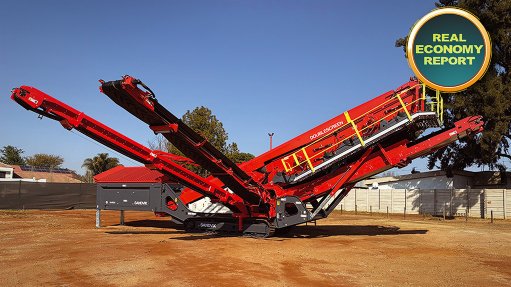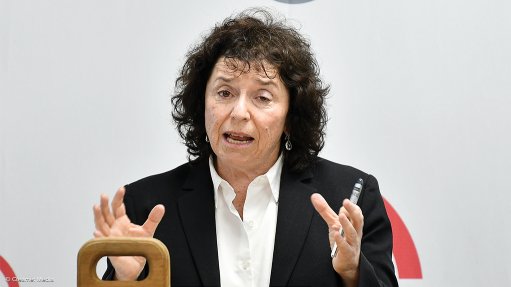No simple solution to illegal mining in Africa



BORIS IVANOV Artisanal and small-scale mining often provides the only means of income and employment for rural communities
NO HOLES BARRED The fight against illegal mining is closely linked to mine security
There is no “one-size-fits-all” solution to combat the rise of illegal mining and the associated artisanal and small-scale mining (ASM) industry in Africa, says diversified mining and exploration company Emiral Resources founder Boris Ivanov.
ASM is a legal industry in many African countries, with various government policies supporting it; however, in some countries, it is still classified as illegal.
“ASM is a major source of mineral resources production globally and a source of income for local communities and migrant labour. It often provides the only means of income and employment for rural communities,” Ivanov says, adding that it is a vital part of livelihood creation.
The problem, he explains, is that the very nature of ASM makes it intrinsically vulnerable to exploitation from organised crime syndicates and to infiltration by political militants.
Ivanov notes that several governments are seeking to formalise the ASM sector, recognising the need to protect and support artisanal mineworkers. Political will – especially at grassroots level – varies, which means that the implementation of regulations to curb illegal mining and associated activity sometimes fails.
“Greater regulation alone is not enough to combat the environmental degradation, socioeconomic challenges, health and safety issues, as well as the security clashes that are intensifying in the ASM sector,” he says.
Further, attempts to push alternative employment programmes and cooperatives have not been easy, he laments.
“Informal mineworkers argue they do not earn nearly as much through alternative jobs such as farming, carpentry and sewing. [They] often begrudge corporate industrial mines claiming the richest concessions, sometimes on land where their families have lived for generations,” Ivanov notes.
By monitoring evolving threats, and by collaborating more broadly with intergovernmental and nongovernmental organisations, as well as with mining operators, the communities, ASM sector and governments in affected countries can stay ahead of the associated risks to business in these dynamic operating environments.
Ivanov believes that governments need to install legal frameworks that remove barriers to formalisation and are not punitive to marginalised communities. These governments must also streamline overly bureaucratic licensing processes to make it cost effective and rewarding to gain a mining licence.
“Solutions must be cheap, easy and quick to introduce, and incentives to help ASM access finance – including microfinance tools, techniques and technology – need to be established.”
Education, employment advice and life coaching on alternative careers, as well as highlighting the dangers of illegal mining, may also help to deter younger generations from participating in criminal activity in the future, Ivanov adds.
He claims that there is consensus among stakeholders that formalising the sector will eradicate some of the most critical issues, but that such action would require countries installing good policies and practices to ensure that ASM can receive the support it needs.
African Security Concerns
Illegal mining is a devastating problem for mines in Africa. Armed “pirate miners” slip into mines unnoticed, blast large sections using illicit means and then proceed to live underground.
Moreover, when they are confronted, violence often erupts, thereby endangering the lives of legitimate mining personnel.
However, the fight against illegal mining is closely linked to mine security, which starts with perimeter security. Ivanov notes that, although perimeter fencing is important, it is often impractical, owing to the large and difficult landscapes of mine sites in Africa.
He adds that Africa’s natural wealth, coupled with high poverty levels, corruption and fractious governments, means that mining projects need to invest adequately to prepare for risk scenarios and ongoing threats.
“Mining security can be multidimensional by nature, and must evolve to meet demands,” Ivanov concludes.
Comments
Press Office
Announcements
What's On
Subscribe to improve your user experience...
Option 1 (equivalent of R125 a month):
Receive a weekly copy of Creamer Media's Engineering News & Mining Weekly magazine
(print copy for those in South Africa and e-magazine for those outside of South Africa)
Receive daily email newsletters
Access to full search results
Access archive of magazine back copies
Access to Projects in Progress
Access to ONE Research Report of your choice in PDF format
Option 2 (equivalent of R375 a month):
All benefits from Option 1
PLUS
Access to Creamer Media's Research Channel Africa for ALL Research Reports, in PDF format, on various industrial and mining sectors
including Electricity; Water; Energy Transition; Hydrogen; Roads, Rail and Ports; Coal; Gold; Platinum; Battery Metals; etc.
Already a subscriber?
Forgotten your password?
Receive weekly copy of Creamer Media's Engineering News & Mining Weekly magazine (print copy for those in South Africa and e-magazine for those outside of South Africa)
➕
Recieve daily email newsletters
➕
Access to full search results
➕
Access archive of magazine back copies
➕
Access to Projects in Progress
➕
Access to ONE Research Report of your choice in PDF format
RESEARCH CHANNEL AFRICA
R4500 (equivalent of R375 a month)
SUBSCRIBEAll benefits from Option 1
➕
Access to Creamer Media's Research Channel Africa for ALL Research Reports on various industrial and mining sectors, in PDF format, including on:
Electricity
➕
Water
➕
Energy Transition
➕
Hydrogen
➕
Roads, Rail and Ports
➕
Coal
➕
Gold
➕
Platinum
➕
Battery Metals
➕
etc.
Receive all benefits from Option 1 or Option 2 delivered to numerous people at your company
➕
Multiple User names and Passwords for simultaneous log-ins
➕
Intranet integration access to all in your organisation



















